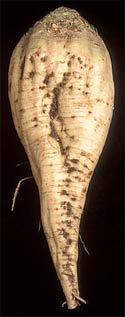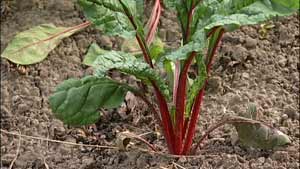Beta Vulgaris, the latin name for the beet species, includes the sugar beet, table beet, and swiss chard varieties. Although each variety is grown for different agricultural purposes, botanically, they are the same plant. Being open pollinated plants from the same species, and not hybrids, they are susceptible to cross-contamination from the pollen of other nearby Beta Vulgaris varieties.

This is the second installment of an ongoing Food News series titled Seeds of Life. Frank Morton, an organic seed breeder from Philomath, Oregon, shares his concerns over the contamination threat from the introduction of transgenic sugar beet crops into the Willamette Valley where his farm is located. For Morton, his main concern, and the reason for his lawsuit against the USDA (and APHIS), is to protect the purity of his swiss chard organic seed from cross pollination (and thus contamination) with the newly introduced transgenic sugar beet crops being grown in the valley. The Willamette Valley is prized for having just the right soils and climate for being a renowned seed production region, surprisingly, possessing unique characteristics few places can match. In Frank Morton’s own words from GMO’s at the Brink: “The Willamette Valley is a world class place to grow seeds, and I love to say that…, because few people realize what a rare thing it is to find an ideal seed production location. Middle latitude, fertile soils, mild wet winters, moderate dry summers, ample irrigation water, a predictable long dry harvest window, and very short agricultural history, distinguish our Valley from most others.”
In a similar but unrelated lawsuit, a St. Louis court recently found Bayer AG, a German Agrochemical conglomerate liable for contaminating two farmer’s rice fields in Texas that resulted from the unintentional escape of Bayer’s two transgenic (test) strains of herbicide resistant rice (engineered to be tolerant to Bayer’s Liberty brand of herbicide). As a result of the transgenic rice contamination, their rice crop was a total loss as both farmers were unable to sell to their oversees markets. It should also be noted, in both instances, neither transgenic (rice) strain had been approved for human consumption.
Next Time: Seeds of Life: Organic Seed Breeder
Check out the links below, for those interested in the Frank Morton series:
- Seeds of Life: David Vs. Goliath (published: 12-2009)
- Seeds of Life: Beta Vulgaris (12-2009)
- Seeds of Life: The Organic Seed Breeder (3-2010)
- Seeds Of Life: Hybrids and the Emergence of Seed Monopolies (3-2010)
- Seeds Of Life: Open Pollination (6-2010)
- Seeds of Life: Consolidation in the Seed Industry (7-2010)
Most of the videos featured on Cooking Up a Story were produced, filmed, and edited by Rebecca Gerendasy. Fred Gerendasy contributed as a writer to many of the posts and occasionally as the interviewer. Visit Rebecca Gerendasy Clay – Art and Fred Gerendasy Photography to see their current work.

